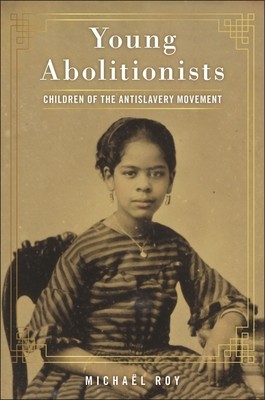
- We will send in 10–14 business days.
- Author: Michaël Roy
- Publisher: New York University Press
- ISBN-10: 1479830097
- ISBN-13: 9781479830091
- Format: 15 x 23.1 x 2.8 cm, kieti viršeliai
- Language: English
- SAVE -10% with code: EXTRA
Reviews
Description
How children helped abolish slavery
During the antebellum period, several abolitionist figures, including William Lloyd Garrison, the editor of the Liberator; Susan Paul, an African American primary school teacher; Henry Clarke Wright, a white reformer; and Frederick Douglass, the internationally renowned activist, consistently appealed to the sympathies of children against slavery. In 1835, Garrison proclaimed, "If . . . we desire to see our land delivered from the curse of PREJUDICE and SLAVERY, we must direct our efforts chiefly to the rising generation." This rallying cry found a receptive audience and ignited action. Despite their limited scholarly exploration, children occupied a crucial position within the US abolition movement. Through a reexamination of archival materials including antislavery newspapers, correspondence, and autobiographies, Young Abolitionists is the first book to center children's participation in the campaign to eradicate slavery in the United States. Michaël Roy uncovers how young advocates--Black and white alike--confidently delivered antislavery speeches within their schools, enrolled in juvenile antislavery societies, and contributed to the editorial process of antislavery newspapers. They aided fugitive slaves, attended antislavery fairs, and engaged in activities commemorating John Brown's legacy. They even affixed their signatures to antislavery petitions, thus challenging the boundaries of their own citizenship. Abolitionists saw childhood as a force for social change. With the help of parents and teachers, children acted in concrete ways against slavery and made a meaningful contribution toward its demise. Young Abolitionists honors their contributions and reminds us that children can--and must--be included in the fight for a better world.EXTRA 10 % discount with code: EXTRA
The promotion ends in 22d.23:59:54
The discount code is valid when purchasing from 10 €. Discounts do not stack.
- Author: Michaël Roy
- Publisher: New York University Press
- ISBN-10: 1479830097
- ISBN-13: 9781479830091
- Format: 15 x 23.1 x 2.8 cm, kieti viršeliai
- Language: English English
How children helped abolish slavery
During the antebellum period, several abolitionist figures, including William Lloyd Garrison, the editor of the Liberator; Susan Paul, an African American primary school teacher; Henry Clarke Wright, a white reformer; and Frederick Douglass, the internationally renowned activist, consistently appealed to the sympathies of children against slavery. In 1835, Garrison proclaimed, "If . . . we desire to see our land delivered from the curse of PREJUDICE and SLAVERY, we must direct our efforts chiefly to the rising generation." This rallying cry found a receptive audience and ignited action. Despite their limited scholarly exploration, children occupied a crucial position within the US abolition movement. Through a reexamination of archival materials including antislavery newspapers, correspondence, and autobiographies, Young Abolitionists is the first book to center children's participation in the campaign to eradicate slavery in the United States. Michaël Roy uncovers how young advocates--Black and white alike--confidently delivered antislavery speeches within their schools, enrolled in juvenile antislavery societies, and contributed to the editorial process of antislavery newspapers. They aided fugitive slaves, attended antislavery fairs, and engaged in activities commemorating John Brown's legacy. They even affixed their signatures to antislavery petitions, thus challenging the boundaries of their own citizenship. Abolitionists saw childhood as a force for social change. With the help of parents and teachers, children acted in concrete ways against slavery and made a meaningful contribution toward its demise. Young Abolitionists honors their contributions and reminds us that children can--and must--be included in the fight for a better world.

Reviews